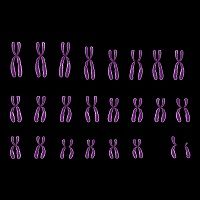Wolf-Hirschhorn Syndrome: Response to Growth Hormone
Small case study shows limited positive benefits in 2 children with Wolf-Hirschhorn syndrome who were treated with growth hormone.

Wolf-Hirschhorn syndrome (WHS or 4p-syndrome), first defined as a unique condition in 1965, results in children born with deletions on the short arm of chromosome 4. Children born with WHS develop a distinctive “Greek helmet” facial appearance (small head, widely-spaced eyes, downturned mouth, short upper lip, and short groove between the upper lip and nose or bilateral cleft lip and small chin), experience severe developmental delays often, and have assorted other birth defects.
Some WHS patients have may have a small deletions on 4p, while others lack more genetic material, and their disease manifestations reflect the magnitude of chromosomal damage. Most affected children—close to 90%—experience seizures that tend to disappear with age. Developmental delays often lead to extremely short stature. A team of researchers writing in Oxford Medical Case Reports recently revealed that 2 children with WHS who were treated with growth hormone (GH) responded well.
Short stature in WHS is not usually linked to GH deficiency but may be associated with a partial GH deficiency. The FDA has not approved GH for use in WHS patients, and no formal studies have been conducted. Some endocrinologists have used GH, and the Wolf-Hirschhorn organization has a forum page devoted to its use. In the forum, parents discuss the decision process they face and also report some good results including increased muscle tone.
This case report indicates that in one child, growth was greater than expected in a child who does not have WHS. Once GH was stopped, the child’s growth decelerated. Similarly, the second child experienced more robust growth than would be expected. Both children had normal GH levels. Neither child had adverse effects, nor were their seizures affected.
The authors published these cases in an attempt to not only add to published experience indicating GH therapy for WHS is associated with sustained acceleration of childhood growth, but also to provide greater detail of that growth over several years.